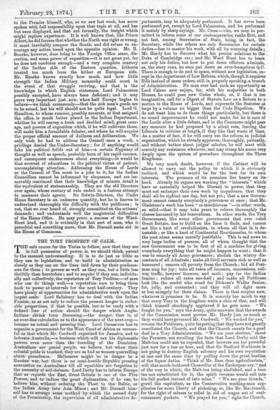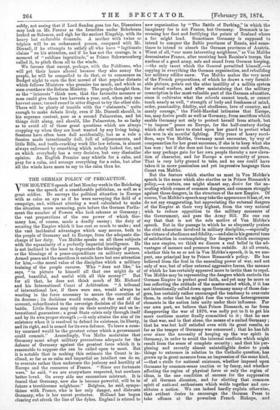THE TORY PROSPECT OF CALM. T HE safe course for the
Tories to follow, now that they are in full possession of power, is, we should think, patent to the meanest understanding. It is to do just as little as they can in legislation, and to build in administration as closely as they can on the lines laid down by their predeces- sors for them ; to govern as well as they can, but a little less thriftily than heretofore ; and to acquire if they can, individu- ally and collectively, the reputation of Tory Peelites,—of men who can do things well,—a reputation sure to bring them back to power at intervals for the next half-century. They have plenty of opportunities for administrative work upon the largest scale. Lord Salisbury has to deal with the Indian Famine, so as not only to reduce the present danger to endur- able proportions, if that be possible, but to be ready with a defined line of action should the danger which Anglo- Indians shrink from discussing,—the danger, that is, of an over-fine calculation as to the appearance of the next crop— become an actual and pressing fear. Lord Carnarvon has to organise a government for the West Coast of Africa as success- ful as that which Mr. Cardwell organised for Jamaica, and to federate Australia,—a business which will tax his diplomatic powers even more than the founding of the Dominion. Australians are genial• people, we believe, but when their colonial pride is touched, they are as bad as women quarrelling about precedence. Melbourne might be in danger in a Russian war, but there is no semi-hostile Republic pressing annexation on Australians till all squabbles are forgotten in the necessity of self-defence. Lord Derby has to inform Europe that as regards the East, Great Britain is one of the Five Powers, and to induce the great diplomatists, if he can, to believe him, without ordering the Fleet to the Baltic, or the Indian Army into Asia Minor ; and Mr. Disraeli him- self has to arrange some method by which the second duty of the Premiership, the supervision of all administrative de- partments, may be adequately performed. It has never been performed yet, except by Lord Palmerston, and he performed it mainly by sharp sayings. Mr. Cross—who, we may be per- mitted to inform some of our contemporaries, ranks first, and not last, among Secretaries of State, being, in fact, the Secretary, while the others are only Secretaries for certain duties—has to master his work, with all its worrying details ; Mr. Hardy has to discover what his precise relations to the , Duke of Cambridge are ; and Mr. Ward Hunt has to learn not only his duties, but how to put down officious admirals, as, the story runs, he once put down an over-bumptious Q.C. There is enough to do and to spare, without new legislation, ex- cept in the department of Law Reform, which, though it requires Bills instead of mere orders, still is, properly speaking, a branch of Administration. No man ever had such an opportunity as Lord Cairns now enjoys, for, with his majorities in both Houses, he could pass new Codes whole, or, if that is too imaginative, call for a Digest of Statute Law as a Return to a motion in the House of Lords, and supersede the Statutes at large by a volume no bigger than the Code Napoleon. We do not want him to do those things particularly, but there is no sound improvement he could not make, for he is sure of the Lords after a little debate, and in the Commons might pass any measure he had proposed by a silent vote, leaving the Liberals to criticise at length, if they like that waste of time. As a matter of fact, if he will carry out the reform in judicial organisation, which he already approves, thoroughly, patiently, and without bother about judges' salaries, he will meet with scarcely any resistance whatever, and may stamp his name very deeply upon the system of procedure throughout the Three Kingdoms.
We very much doubt, however, if the Cabinet will be allowed to carry out the policy to which it is obviously inclined, and which would be far the beat for its own interests. The pressure of its promises lies heavy on its head. Already its organs are warning the "interests" which have so materially helped Mr. Disraeli to power, that they must not endanger their own work by impatience, that they shall all be righted one day, but not yet ; that a new Govern- ment cannot remedy everybody's grievances at once ; that Mr. Gladstone's work has been " so mischievous "—in other words, so solid—that it may take years to relieve thoroughly the classes harassed by his innovations. In other words, the Tory Government, like every other government that ever ruled Great Britain, has to build on the lines it finds, and cannot act like a knot of revolutionists, to whom all that is is de- testable ; or like a knot of Continental Reactionaries, to whom the past alone seems morally justifiable. This is sad news to very large bodies of persons, all of whom thought that the new Government was to be first of all a machine for giving everybody everything that he might happen to want ; that it was to remedy all Army grievances ; abolish the wintry dis- contents of all Admirals ; make all Civil servants rich as well as honoured ; remove all poverty from the Church ; bid all Post- men sing for joy ; take all taxes off incomes, successions; rail- way traffic, lawyers' licences, and malt ; pay for the Indian famine ; reduce all rates one-half ; and make all Publicans look like the model who stood for Dickens's Weller Senior, fat, jolly, and contented ; and they will all fight more or less savagely for their claims. There is that surplus now, whatever it promises to be. It is scarcely too much to say that every Tory in the kingdom waits a slice of that, and will think himself shockingly aggrieved if he gets none. " We fought for you," says the Army, quite unaware that the awards of the Commission must govern Mr. Hardy just as much as they would have governed Mr. Cardwell. " We worked for you," scream the Publicans, quite forgetting that they have not greatly conciliated the Church, and that the Church counts for a good deal in a Tory Administration. " We are your electors," shout the Farmers, not recalling the facts that Lord Derby said the Malt-tax could not be repealed, that brewers are too powerful just now for a tax on beer, and that Sir Stafford Northcote is not going to destroy English solvency and his own reputation at one and the same time by pulling down the great bastion of the liquor duties. " Think of Mr. Bass, dear agriculturists," will that much-bothered Chancellor of the Exchequer say," and of the way in which, the Malt-tax being abolished, and a beer tax not substituted for it, the spirit revenue would roll into his full pocket instead of into mine." " We are your friends," growl the capitalists, as the Conservative working-man sup- plicates for more liberty of picketing, or, like Mr. Macdonald, for the right of miners to relief in aid of wages out of coal- consumers' pockets. " We prayed for you," sighs the Church,
softly, not seeing that if Lord Sandon goes too far, Dissenters may look on Mr. Forster as the Israelites under Rehoboam looked on Solomon, and sigh for the ancient Kingship, with its heavy but endurable demands. A mother with twins or triplets will be an unharassed person, compared with Mr. Disraeli, if he attempts to satisfy all who have " legitimate claims " on his attention, and if he has not the courage, in a moment of " sublime ingratitude," as Prince Schwarzenberg called it, to pitch them all to the winds. We foresee that except, perhaps, with the Publicans, who will get their hours altered because they also annoy the people, he will be compelled to do that, or to commence on Budget night to earn the first morsel of that popular distaste which follows Ministers who promise too much, and which so soon overthrew the Reform Ministry. The people thought then, as the "interests" think now, that the favourite measure or man could give them two harvests a year, and, when only one harvest came, turned round in utter disgust to try the other side. There will be plenty of trouble with the " claimants," quite enough to make debate lively, even if Mr. Disraeli should, in his supreme content, pose as a second Palmerston, and let things drift along, and should, like Palmerston, be so lucky as to avoid all of those great questions which are always cropping up when they are least wanted by any living being. Sessions have often been dull accidentally, but as a rule a Session made intentionally dull, full of adjournments, and little Bills, and tooth-cracking work like law reform, is almost always enlivened by something which nobody looked for, and on which everybody has a very decisive, but very dissimilar opinion. An English Premier may whistle for a calm, and pray for a calm, and arrange everything for a calm, but after all the winds have more to say to the calm than he.



































 Previous page
Previous page